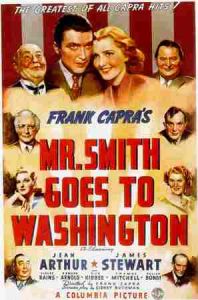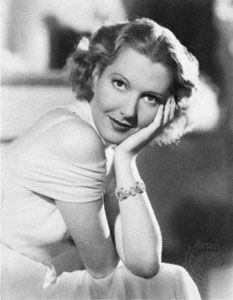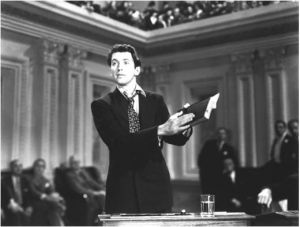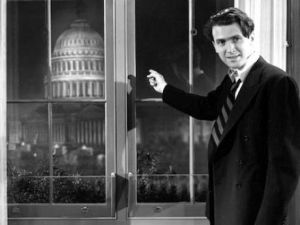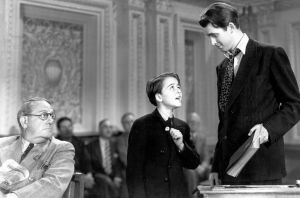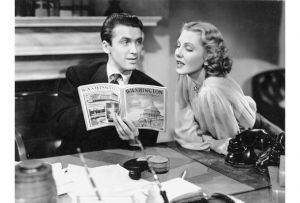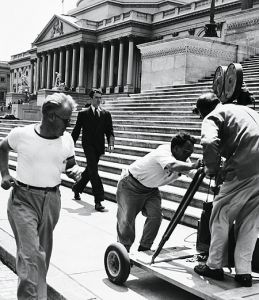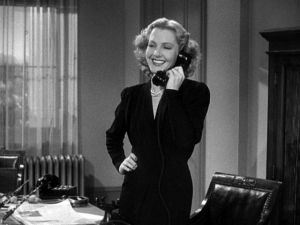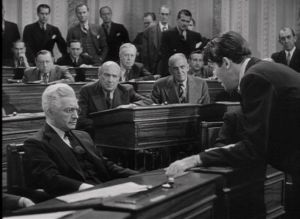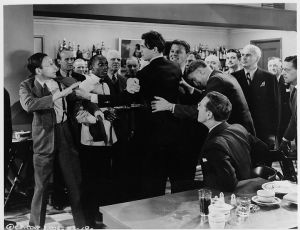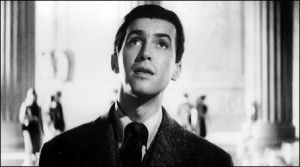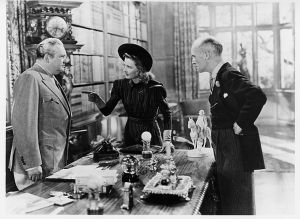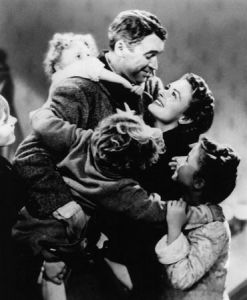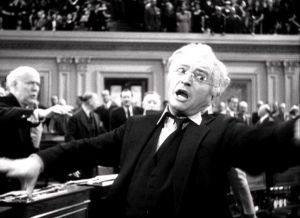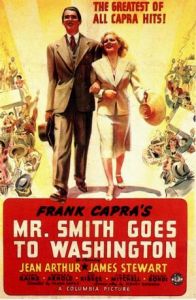Mr. Smith Goes to Washington
Mr. Smith Goes to Washington (史密斯先生去华盛顿) is a 1939 American drama film about one man's effect on American politics. It was directed by Frank Capra, his last film for Columbia Pictures, the studio where he made his name and written by Sidney Buchman, based on Lewis R. Foster's unpublished story. Mr. Smith Goes to Washington was controversial when it was released, but also successful at the box office, and made Stewart a major movie star. In 1989, the Library of Congress added Mr. Smith Goes to Washington to the United States National Film Registry, for being "culturally, historically, or aesthetically significant."
Directed by: Frank Capra
Produced by: Frank Capra
Written by: Sidney Buchman
Narrated by: Colin James Mackey
Music by: Dimitri Tiomkin
Cinematography Joseph Walker
Editing by: Al Clark, Gene Havlick
Distributed by: Columbia Pictures
Release dates:
October 17 1939 (DC premiere)
October 19 (general US)
June 1 1949 (US re-release)
Running time: 129 minutes
Country: United States
Language: English
Genre: Drama
Color: Black and White
James Stewart as Jefferson Smith
Claude Rains as Senator Joseph Harrison Paine
Edward Arnold as Jim Taylor
Guy Kibbee as Governor Hubert "Happy" Hopper
Thomas Mitchell as Diz Moore
Jean Arthur as Clarissa Saunders
Eugene Pallette as Chick McGann
Beulah Bondi as Ma Smith
H.B. Warner as Senator Agnew
Harry Carey as President of the Senate
Astrid Allwyn as Susan Paine
The governor of an unnamed western state, Hubert "Happy" Hopper (Guy Kibbee), has to pick a replacement for recently deceased U.S. Senator Sam Foley. His corrupt political boss, Jim Taylor (Edward Arnold), pressures Hopper to choose his handpicked stooge, while popular committees want a reformer. The governor's children want him to select Jefferson Smith (James Stewart), the head of the Boy Rangers. Unable to make up his mind, Hopper decides to flip a coin. When it lands on its side and next to a newspaper story on one of Smith's accomplishments. He chooses Smith, calculating that his wholesome image will please the people while his naiveté (The state or quality of being inexperienced or unsophisticated, especially in being artless, credulous, or uncritical.) will make him easy to manipulate.
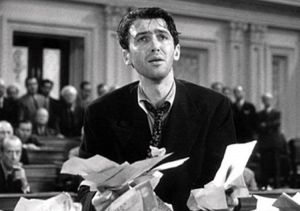
Smith is taken under the wing of the publicly esteemed, but secretly crooked, Senator Joseph Paine (Claude Rains), who was Smith's late father's oldest and best friend, and he develops an immediate attraction to the senator's daughter, Susan (Astrid Allwyn). The unforgiving Washington press quickly labels Smith a bumpkin, with no business being a senator. Paine, to keep Smith busy, suggests he propose a bill. Smith comes up with legislation that would authorize a federal government loan to buy some land in his home state for a national boys' camp, to be paid back by youngsters across America. Donations pour in immediately. However, the proposed campsite is already part of a dam-building graft scheme included in a Public Works bill framed by the Taylor political machine and supported by Senator Paine.
Unwilling to crucify the worshipful Smith so that their graft plan will go through, Paine tells Taylor he wants out, but Taylor reminds him that Paine is in power primarily through Taylor's influence. Through Paine, the machine accuses Smith of trying to profit from his bill by producing fraudulent evidence that Smith owns the land in question. Smith is too shocked by Paine's betrayal to defend himself, and runs away. However, his chief of staff, Clarissa Saunders (Jean Arthur), has come to believe in him, and talks him into launching a filibuster to postpone the Works bill and prove his innocence on the Senate floor just before the vote to expel him. While Smith talks non-stop, his constituents try to rally around him, but the entrenched opposition is too powerful, and all attempts are crushed. Due to influence of the Taylor "machine", on his orders, newspapers and radio stations in Smith's home state refuse to report what Smith has to say and even twist the facts against the Senator. An effort by the Boy Rangers to spread the news results in vicious attacks on the children by Taylor's minions.
Although all hope seems lost, the senators begin to pay attention as Smith approaches utter exhaustion. Paine has one last card up his sleeve. He brings in bins of letters and telegrams from Smith's home state from people demanding his expulsion. Nearly broken by the news, Smith finds a small ray of hope in a friendly smile from the President of the Senate (Harry Carey). Smith vows to press on until people believe him, but immediately collapses in a faint. Overcome with guilt, Paine leaves the Senate chamber and attempts to kill himself. When he is stopped, he bursts back into the Senate chamber, loudly confesses to the whole scheme, and affirms Smith's innocence.
Columbia Pictures originally purchased Lewis R. Foster's unpublished story, variously called The Gentleman from Montana and The Gentleman from Wyoming, as a vehicle for Ralph Bellamy (an American actor), but once Frank Capra came onboard as director. After Rouben Mamoulian (an Armenian-American film and theatre director) had expressed interest, the film was to be a sequel to his Mr. Deeds Goes to Town, called Mr. Deeds Goes to Washington, with Gary Cooper reprising his role as Longfellow Deeds.[4] Because Cooper was unavailable, Capra then "saw it immediately as a vehicle for Jimmy Stewart and Jean Arthur," and Stewart was borrowed from MGM (an American media company). Capra said of Stewart:"I knew he would make a hell of a Mr. Smith... He looked like the country kid, the idealist. It was very close to him." Although a youth group is featured in the story, the Boy Scouts of America (one of the largest youth organizations in the United States to train youth in responsible citizenship, character development, and self-reliance) refused to allow their name to be used in the film and instead the fanciful "Boy Rangers" was used.
To make his voice hoarse for the filibuster scene, James Stewart dried out his throat with bicarbonate of soda. However, both Frank Capra and Stewart revealed in interviews that his throat was periodically swabbed with mercuric chloride.
The film was in production from April 3 1939 to July 7 of that year. Some location shooting took place in Washington, DC, at Union Station and at the United States Capitol, as well as other locations for background use. The set for the Senate chamber was constructed on two newly built adjoining stages at Columbia, stage 8 and 9. The set was built almost to scale, and was at that time, the largest set built on a Columbia sound stage.
In the studio, to ensure authenticity, an elaborate set was created, consisting of Senate committee rooms, cloak rooms, hotel suites as well as specific Washington, DC monuments, all based on a trip Capra and his crew made to the capital. Even the Press Club of Washington was reproduced in minute detail, but the major effort went into a faithful reproduction of the Senate Chamber on the Columbia lot. James D. Preston, a former superintendent of the Senate gallery, acted as technical director for the Senate set, as well as advising on political protocol. The production also utilized the "New York street set" on the Warner Bros. lot, using a thousand extras when that scene was shot.
The film has often been listed as among Capra's best, but it has been noted that it marked a turning point in Capra's vision of the world, from nervous optimism to a darker, more pessimistic tone. Beginning with American Madness in 1932, such Capra films as Lady for a Day, It Happened One Night, Mr. Deeds Goes to Town, and You Can't Take It With You had trumpeted their belief in the decency of the common man. In Mr. Smith Goes to Washington, however, the decent common man is surrounded by the most venal, petty, and thuggish group of yahoos ever to pass as decent society in a Capra movie. Everyone in the film -- except for Jefferson Smith and his tiny cadre of believers -- is either in the pay of the political machine run by Edward Arnold's James Taylor or complicit in Taylor's corruption through their silence, and they all sit by as innocent people, including children, are brutalized and intimidated, rights are violated, and the government is brought to a halt.
President of Senate: The Chair recognizes... Senator Smith!
Jefferson Smith: Thank you, sir.
Clarissa Saunders: Diz, here we go.
Jefferson Smith: Well, I guess the gentlemen are in a pretty tall hurry to get me out of here. The way the evidence has piled up against me, I can't say I blame them much. And I'm quite willing to go, sir, when they vote it that way - but before that happens I've got a few things I want to say to this body. I tried to say them once before, and I got stopped colder than a mackerel. Well, I'd like to get them said this time, sir. And as a matter of fact, I'm not going to leave this body until I do get them said.
Senator Joseph Paine: Mr. President, will the Senator yield?
President of Senate: Will the Senator yield?
Jefferson Smith: No, sir, I'm afraid not, no sir. I yielded the floor once before, if you can remember, and I was practically never heard of again. No sir. And we might as well all get together on this yielding business right off the bat, now.
Jefferson Smith: Now, I had some pretty good coaching last night, and I find that if I yield only for a question or a point of order or a personal privilege, that I can hold this floor almost until doomsday. In other words, I've got a piece to speak, and blow hot or cold, I'm going to speak it.
Senator Joseph Paine: Will the Senator yield?
President of Senate: Will Senator Smith yield?
Jefferson Smith: Yield how, sir?
Senator Joseph Paine: Will he yield for a question?
Jefferson Smith: For a question, all right.
When Smith arrives in Washington on the train, he's seen walking towards the exit with a porter behind him carrying his bags. The next shot shows the same porter coming into the station carrying someone else's bags.
When the governor enters the Smith's home (with the band playing) we see, from the outside, Ma closing the door almost shut. When the scene shifts to inside the house, Ma is again closing the same door.
When it was first released, the film premiered in Constitution Hall in Washington, D.C., on October 17, 1939, sponsored by the National Press Club, an event to which 4000 guests were invited, including 45 senators. Mr. Smith Goes to Washington was attacked by the Washington press, and politicians in the U.S. Congress, as anti-American and pro-Communist for its portrayal of corruption in the American government. While Capra claims in his autobiography that some senators walked out of the premiere, contemporary press accounts are unclear about whether this occurred or not, or whether senators yelled back at the screen during the film.
One of the ways that some senators attempted to retaliate for the damage they felt the film had done to the reputation of their institution was by pushing the passage of the Neely Anti-Block Booking Bill, which eventually led to the breakup of the studio-owned theater chains in the late 1940s. Columbia responded by distributing a program which put forward the film's patriotism and support of democracy, and publicized the film's many positive reviews.
Alben W. Barkley, the Senate Majority Leader, called the film "silly and stupid," and said it "makes the Senate look like a bunch of crooks." He also remarked that the film was "a grotesque distortion" of the Senate, "as grotesque as anything ever seen! Imagine the Vice President of the United States winking at a pretty girl in the gallery in order to encourage a filibuster!" Barkley thought the film "...showed the Senate as the biggest aggregation of nincompoops on record!"
Joseph P. Kennedy, the American Ambassador to Great Britain, wrote to Capra and Columbia head Harry Cohn to say that he feared the film would damage "America's prestige in Europe", and because of this urged that it be withdrawn from European release. Capra and Cohn responded citing the film's review, which mollified Kennedy to the extent that he never followed up, although he privately still had doubts about the film.
"Capra is operating, of course, under the protection of that unwritten clause in the Bill of Rights entitling every voting citizen to at least one free swing at the Senate. Mr. Capra's swing is from the floor and in the best of humor; if it fails to rock the august body to its heels — from laughter as much as from injured dignity — it won't be his fault but the Senate's, and we should really begin to worry about the upper house."
—The critic for the New York Times, Frank S. Nugent
I was dismayed to see a comment, obviously from a young viewer of this film, that said that the characters weren't realistic because no one used profanity. This is a sad testimonial to our culture, when it inconceivable to young people that there was once a time when profanity was the exception and not the rule.
This film is wonderful in so many ways. The story is a classic struggle between good and evil. In typical Capra style, the protagonist and antagonists are exaggerated so there is no confusion as to who are the good guys and who are the bad guys. If there is one clear message in Capra's films it is that those with strong moral fiber never give up hope. He likes to create utterly hopeless situations for characters to test their integrity, and rewards unswerving adherence to basic values and principles by triumph against the odds.
Oscar (Academy Awards, USA)
Best Actor in a Leading Role, James Stewart
Best Actor in a Supporting Role, Harry Carey
Best Actor in a Supporting Role, Claude Rains
Best Art Direction, Lionel Banks
Best Director, Frank Capra
Best Film Editing, Gene Havlick, Al Clark
Best Music, Scoring, Dimitri Tiomkin
Best Picture
Best Sound, Recording, John P. Livadary
Best Writing, Screenplay, Sidney Buchman
Oscar (Academy Awards, USA)
New York Film Critics Circle Awards
Best Actor, James Stewart
No.29 on 1998 AFI's 100 Years... 100 Movies
No.11 on 2003 AFI's 100 Years... 100 Heroes and Villains: Jefferson Smith, hero
No.5 on 2006 AFI's 100 Years... 100 Cheers
No.26 on 2007 AFI's 100 Years... 100 Movies (10th Anniversary Edition)
附件列表
词条内容仅供参考,如果您需要解决具体问题
(尤其在法律、医学等领域),建议您咨询相关领域专业人士。
如果您认为本词条还有待完善,请 编辑
上一篇 The Shawshank Redemption肖申克的救赎 下一篇

